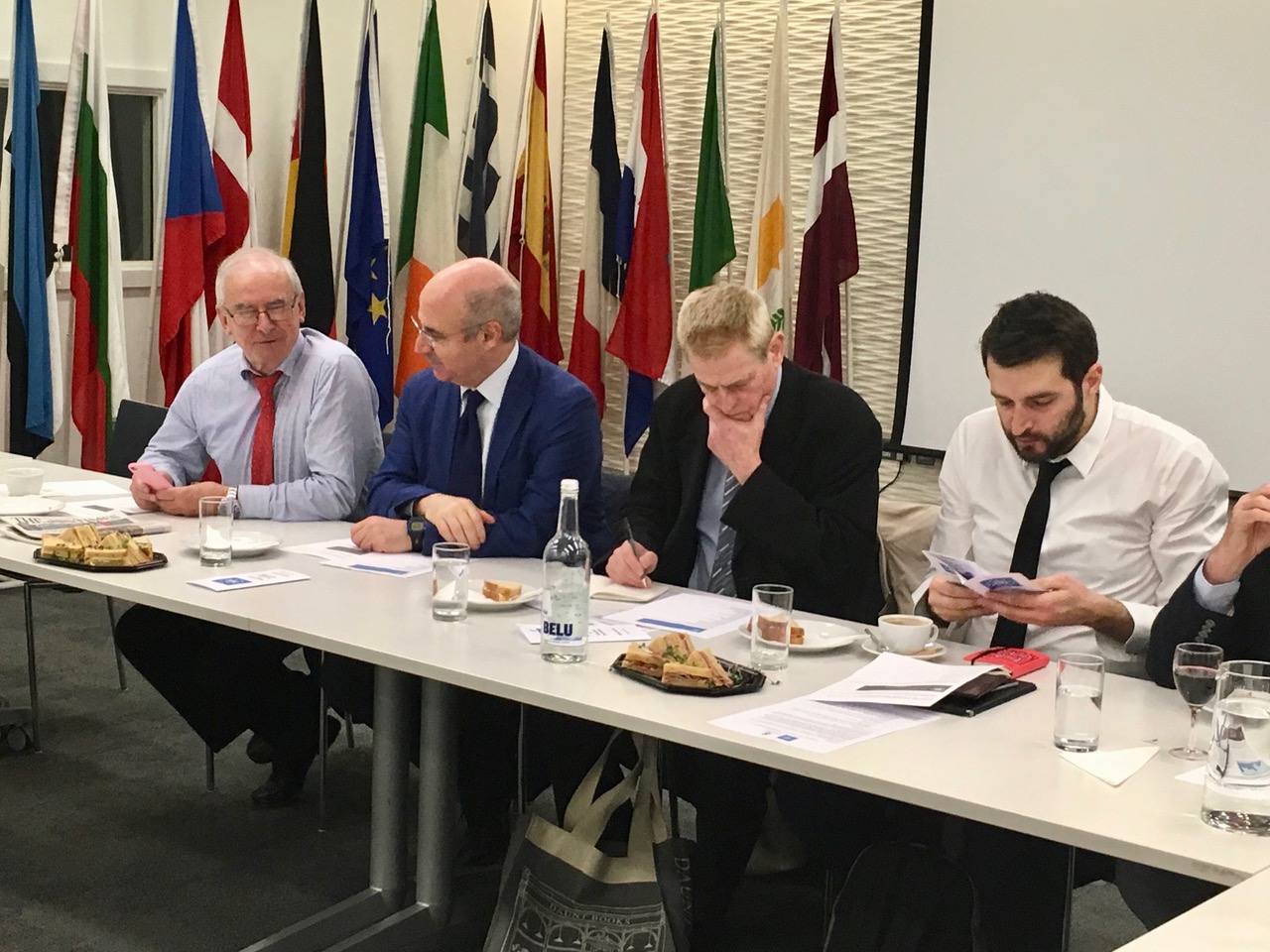For seven years since the UK referendum on leaving the EU, the AEJ UK has invited a range of guests to discuss many aspects of Brexit.
2023
18 April 2023
Anand Menon – Brexit, an audit
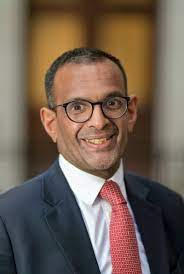
Anand Menon, director of UK in a Changing Europe, predicts that Prime Minister Rishi Sunak’s Windsor Framework agreement resetting trade rules for the island of Ireland will remain the formal template for relations with the European Union for the “medium term”.
And that is likely to mean under the current Conservative government and probably under the next government even if it’s led by Labour after elections expected late in 2024.
But it does not preclude separate agreements in specific areas such as scientific research and security for example.
Anand Menon teaches European politics and foreign affairs at King’s College London and was appointed in January 2014 as director of UK in a Changing Europe, a think tank funded by the Economic and Social Research Council (ESRC) – the UK’s largest organisation for funding research on economic and social issues and part of a UK government funded “non-departmental public body” responsible to Parliament.
At an AEJ UK lunch meeting on April 18 he presented a comprehensive, detailed and even-handed analysis of the current state of Brexit and answered questions from members and guest journalists.
In particular, he signalled immediate potential problems with the government’s plans to scrap thousands of EU laws through the “Retained EU Law (Revocation and Reform) Bill”, currently due for detailed examination in the House of Lords.
If passed, the law would end legislation and regulation at the end of 2023 in a variety of areas, from food standards to airline safety, which has not yet been assimilated into UK law – rules inherited and retained from the EU.
The problems he noted include:
- not knowing if all the rules have yet been identified
- wholesale deregulation in a number of sectors without consultation with stakeholders
- lack of clarity on the role of government departments and the civil service in deciding which rules to save or scrap
- potential internal market divergence as many regulations are now in areas of devolved competence
The government delayed further consideration of the proposed law in the House of Lords until mid-May – after local elections in England and Wales and after wide opposition from business, environmental groups, and unions.
The legislation was originally championed by Jacob Rees-Mogg and other hardline Tory Brexiters but there is speculation that the government has begun a full-scale retreat on the plans.
Audio recording of Anand Menon at the AEJ UK
Anand Menon slide presentation – downloadable
Anand Menon slide presentation as PDF file
Government delays Lords examination of law to repeal EU rules – Politics Home
Government retreats on EU rules repeal? – The Observer
Britain sending wrong signals? – Daily Express
Anand Menon
Anand Menon at UK in a Changing Europe
Economic and Social Research Council
Anand Menon on Rishi Sunak’s Windsor Framework
Anand Menon at King’s College London
21 March 2023
Simon French – The UK economy – not as bad as you might believe

Simon French, chief economist at British investment bank Panmure Gordon and former senior civil servant, says the UK’s economic performance and outlook are both broadly in line with other G7 economies despite pessimism from some in business, politics, and the media.
In a presentation at an AEJ UK lunch meeting on 21 March 2023, French used a series of charts to detail economic data over a number of different periods to show that the UK is not in a particular or permanent negative position despite recent political turmoil, a sharp decline in trade with the EU due to Brexit, and a drop in foreign inward investment.
And he pointed to some advantages for the UK in its current situation as he examined key data and drivers for the UK economy this year – political, economic, domestic and international – and policy responses from the UK government and Bank of England.
French leads Panmure Gordon bank’s research in economics and equity strategy and before 2015 worked for the UK government, latterly at the cabinet office as chief of staff to the UK government chief operating officer.
He had a central role in implementing the coalition government’s spending reforms between 2010 and 2014 as well as working on the UK’s welfare and pension reforms between 2002 and 2008.
Report on meeting from AEJ UK Treasurer David Worsfold
Audio recording of Simon French at the AEJ UK
Simon French slide presentation
Simon French slides as PDF file
Simon French at Panmure Gordon
Simon French at the AEJ UK 21 March 2023
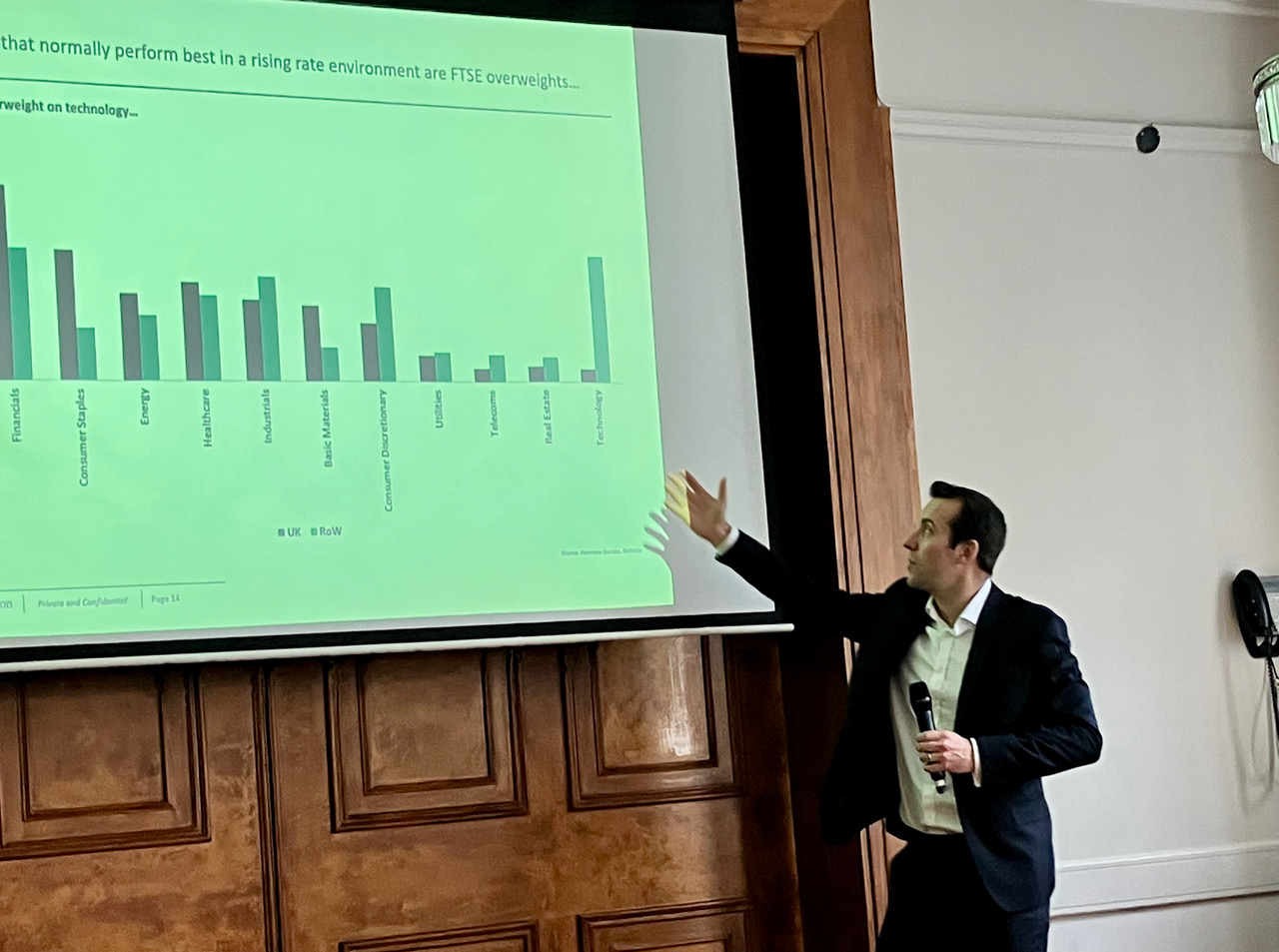
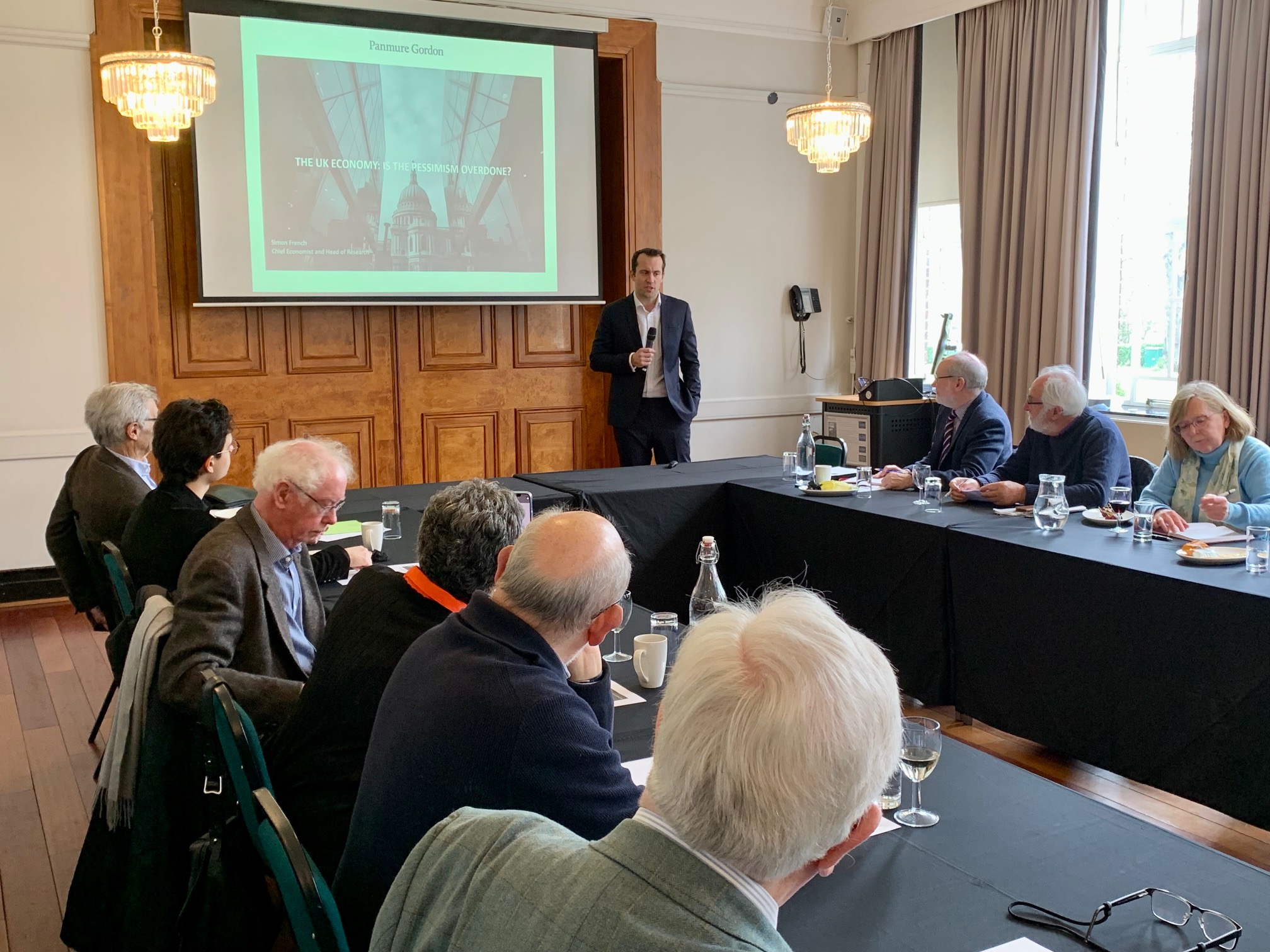
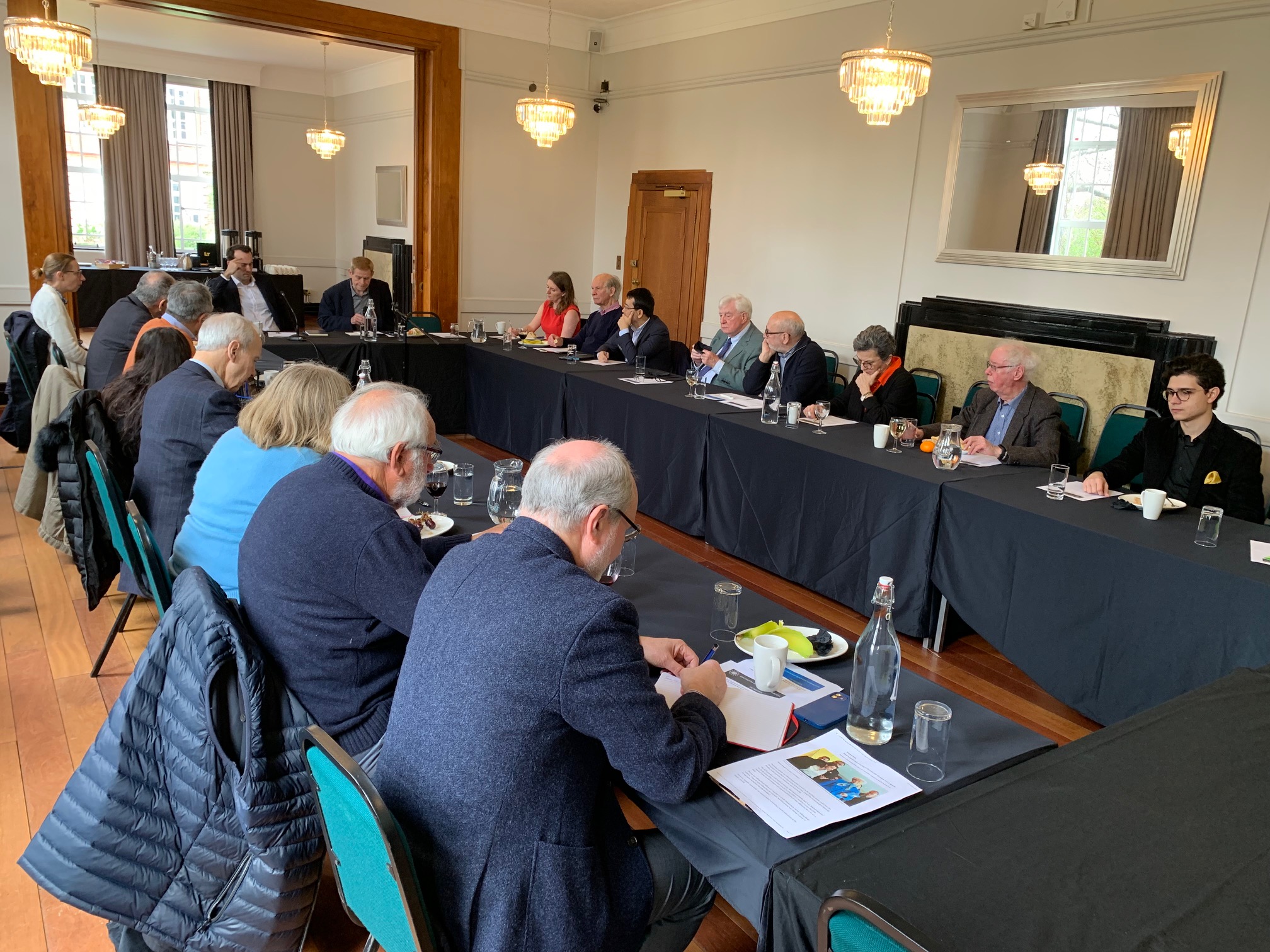
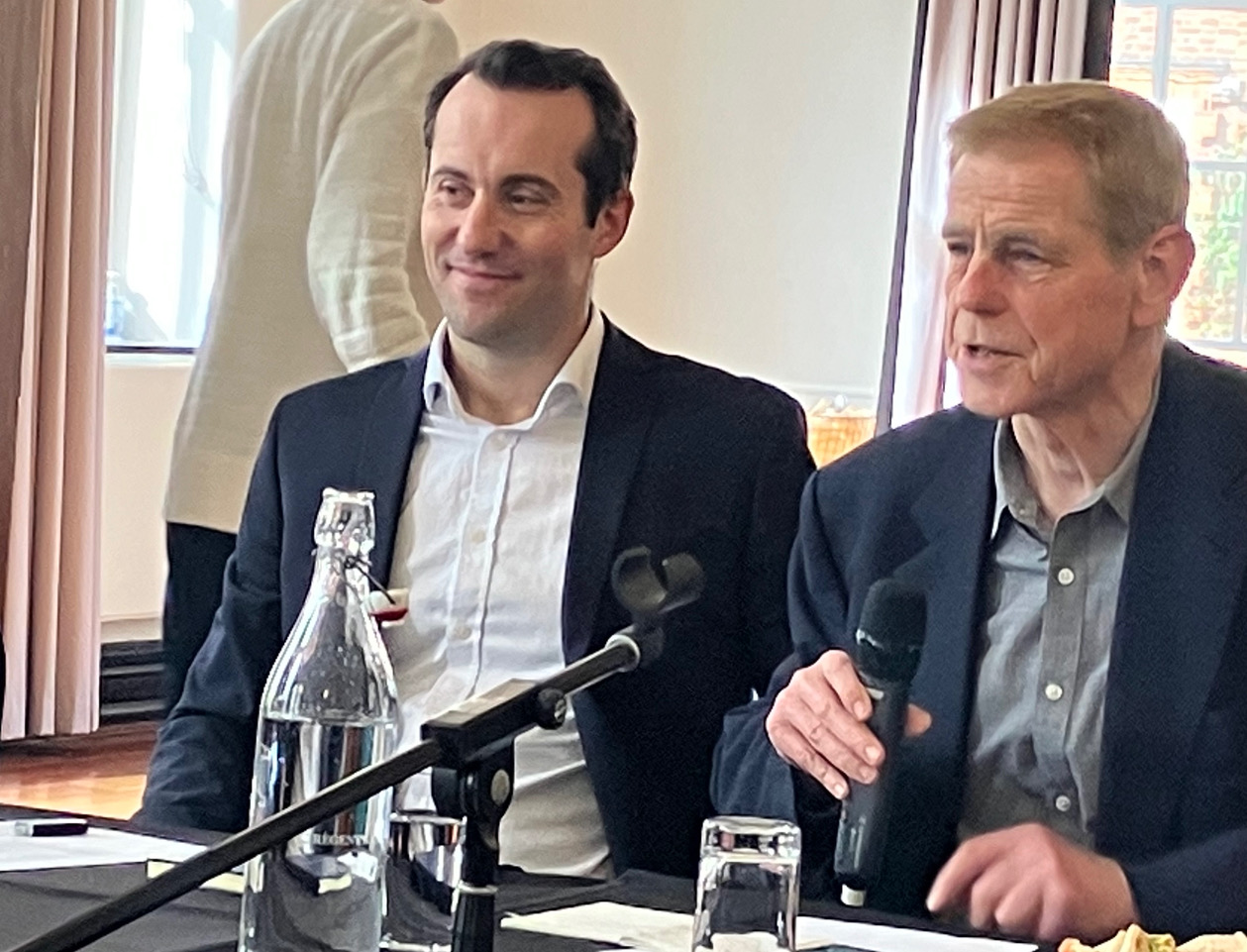
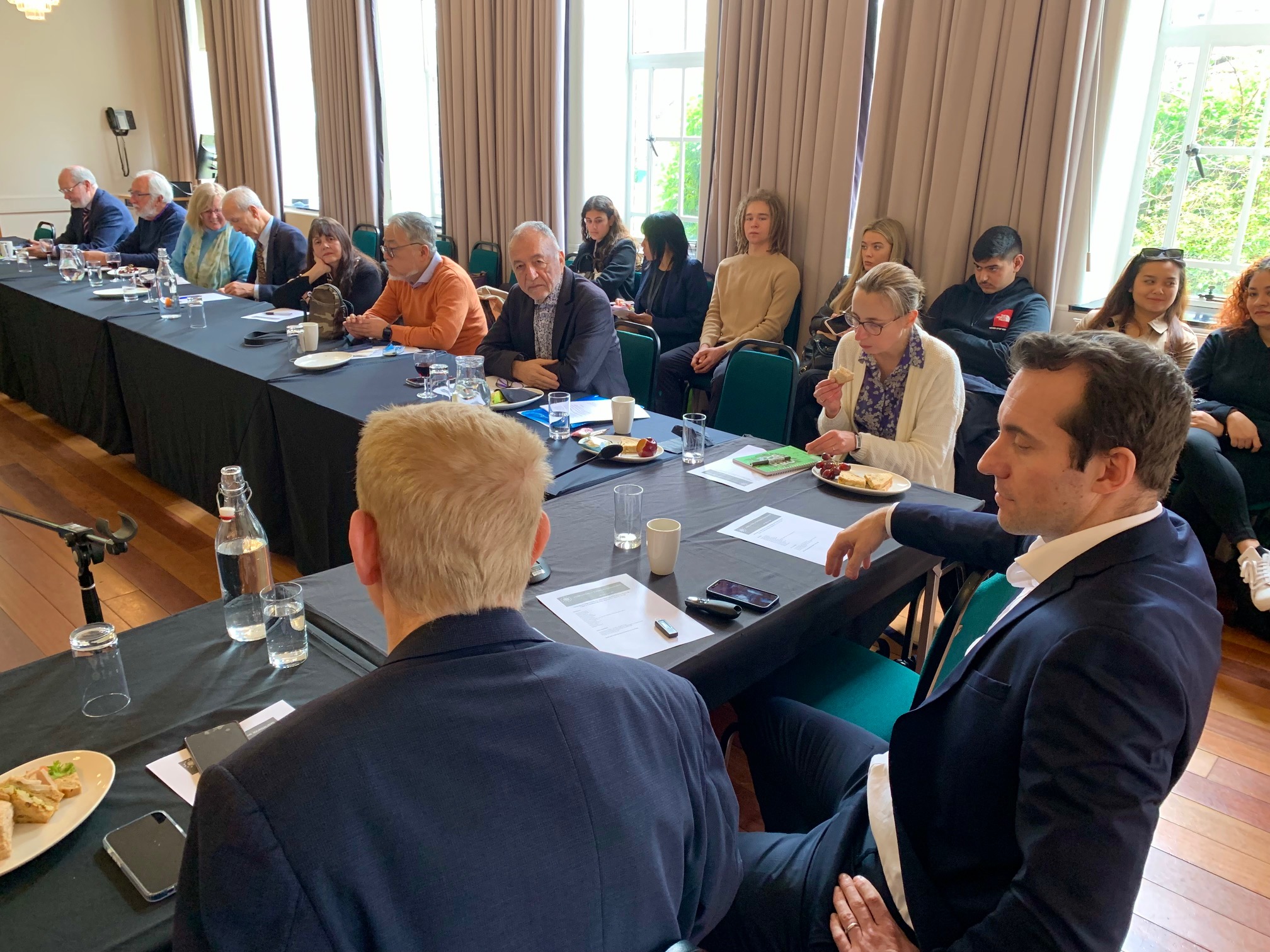
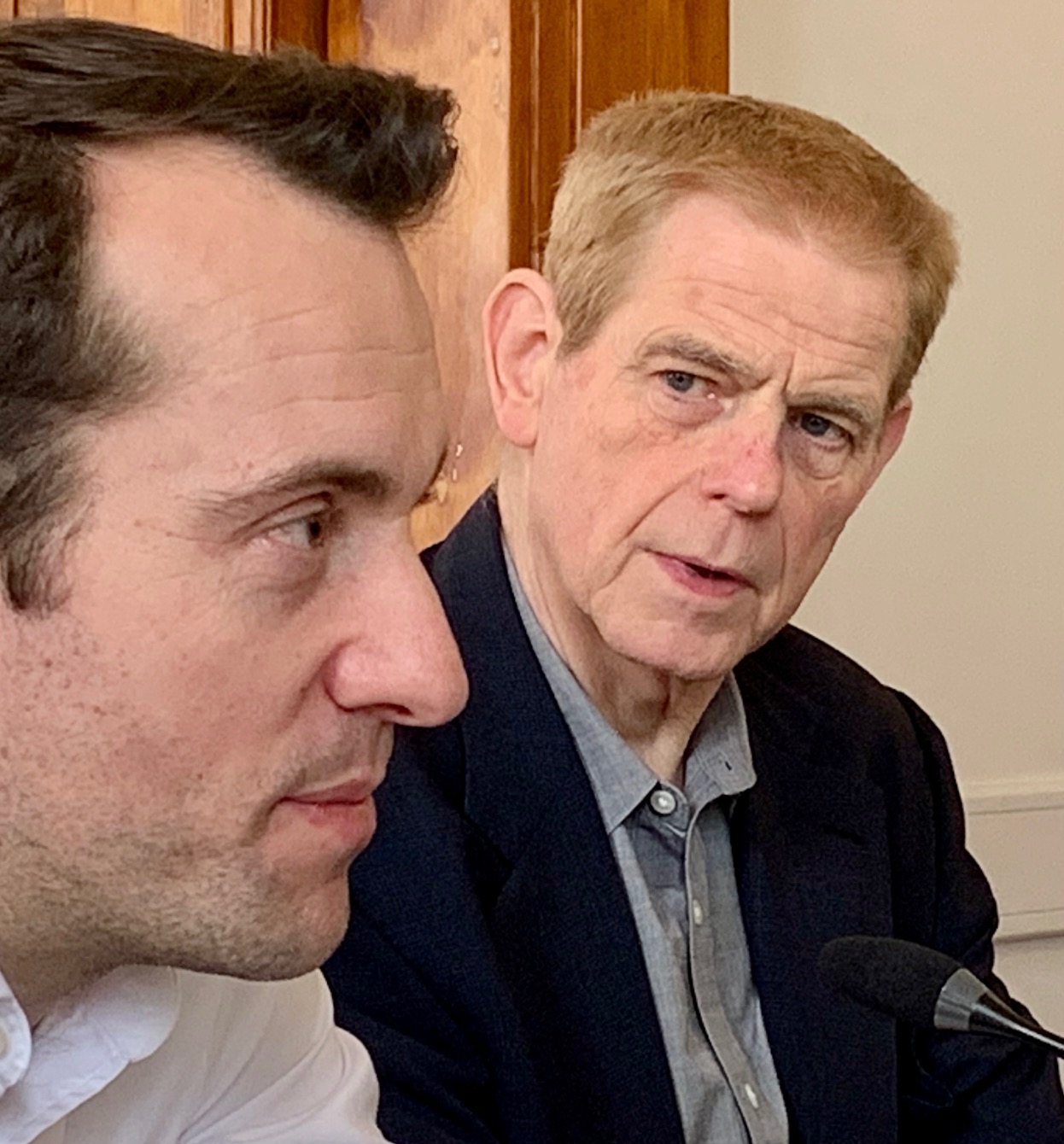
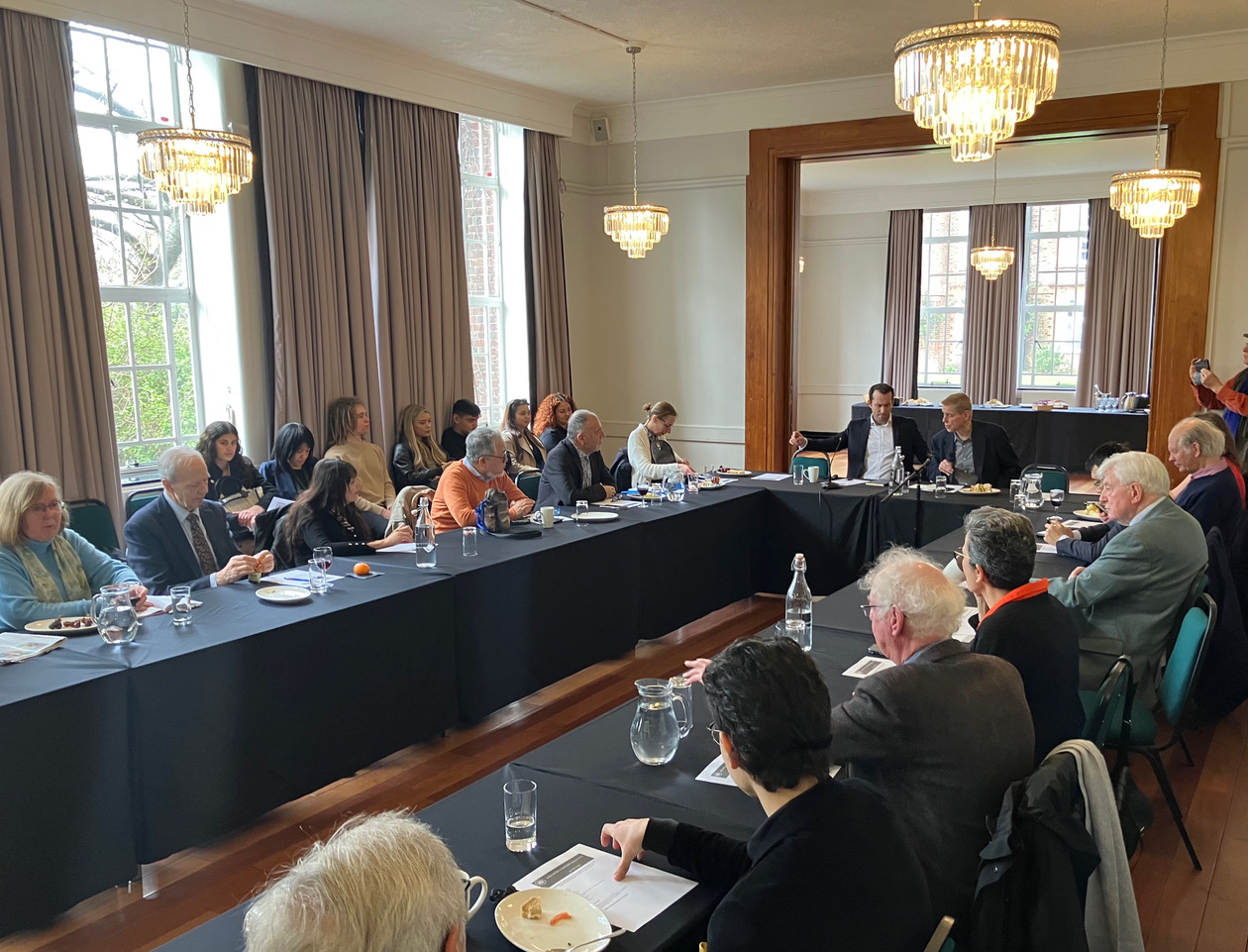
2021
9 September 2021
Brendan Simms – Brexit breakup?

Is the United Kingdom about to fall apart? No is the short answer from history professor Brendan Simms. In fact he argues that Brexit will actually make the United Kingdom stronger after a period of flux with Ireland and Scotland.
He made his case at an online AEJ meeting on 9 September 2021 using a complex analysis of the history of the UK and its relationships with Europe combined with his view of political events in the last 5 years.
Simms is professor of the history of European international relations and director of the Centre for Geopolitics at Cambridge University whose published historical works – including Europe: The Struggle for Supremacy, 1453 to the Present and Britain’s Europe: A Thousand Years of Conflict and Cooperation– have cast a penetrating light on past European military and political conflicts and shifting alliances that eventually united England with the three other nations of the British Isles in a United Kingdom. A frequent contributor to the New Statesman and other media, his recent writing since the 2016 Brexit vote has illuminated the ways in which ancient rival nationalisms, and modern tensions between rival legal and political systems, underlie the most incendiary topics in today’s news agenda on Europe – in particular the renewed drive for Scottish independence and the highly-charged dispute between the UK and the EU over the status of Northern Ireland after Brexit.
Please see this report written jointly by AEJ member Martyn Bond and AEJ UK chairman William Horsley and this audio record of the meeting.
26 April 2021
Joao Vale de Almeida – Life after Brexit
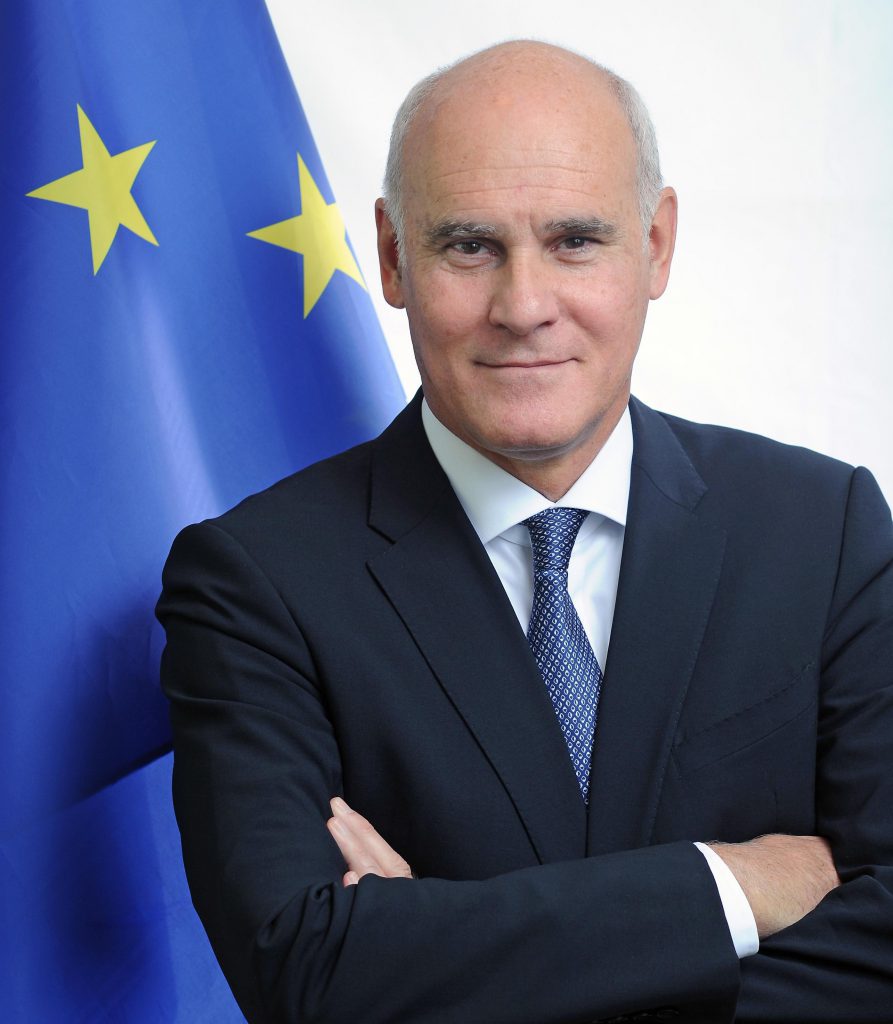
Adjustment, adaptation, acceptance: three words from the EU’s ambassador to the United Kingdom sum up the challenges facing Brexit Britain.
João Vale de Almeida told the AEJ UK on April 26 that all three are needed to meet the opportunities and challenges of future relations between the EU and the UK. By contrast, the ambassador has needed stoicism and patience during his first 15 turbulent months in office since taking up his post on February 1 2020, the first full day of Brexit after the UK’s departure from the European Union. Even his title is in dispute as the UK government has so far refused to grant him the same diplomatic status as it gives to envoys of nation states.
In those 15 months, tensions have flared between London and Brussels over the Brexit agreement’s Northern Ireland Protocol, its effects on trade between the British mainland and Northern Ireland, fishing rights, and over the supply of Covid 19 vaccines between manufacturing sites in the UK and the EU.
João Vale de Almeida brings a wealth of diplomatic experience to his role at this crucial time in UK-EU relations. He has occupied a succession of senior EU posts since joining the European Commission in 1982 in Lisbon, including EU ambassador to the UN and to the USA, director general of the EU’s External Action Service, and head of the EU Commission president’s office when fellow Portuguese national Jose Manuel Barroso was president. For more on his presentation please see this report from former FT economics editor Peter Norman and this audio record of the meeting.
26 March 2021
Ed Balls – Global Britain

What is the future for Britain post Brexit? That’s the question Ed Balls would like the UK to debate, publicly and sensibly.
The former Labour Chancellor argues that it needs to steer a middle course, truly accepting that Britain has left the EU and making the right choices to prosper domestically and internationally. And he says failure to get Global Britain right could endanger the very existence of a “United Kingdom”.
Speaking at the AEJ UK on March 26, the former politician – and celebrity dancer, champion cook, and documentary maker – warned that the “Global Britain” slogan poses major challenges for the UK’s two main political parties and their leaders who will have to “start building an answer about what a modern forward looking Global Britain looks like outside the EU”. Now professor of political economy at King’s College London and a research fellow at the Harvard Kennedy School, Balls co-authored “Finding Global Britain“, a vision of how to turn what was a Brexiteer slogan into policies for “a pragmatic but ambitiously outward-looking and progressive country”.
The Harvard University paper focused on five themes: trade policy, regulation, migration, domestic inequalities, and the need for a new national narrative. At the AEJ, Balls detailed some of the challenges and opportunities inherent in that. For more please see this report by Peter Norman, AEJ meetings secretary and former economics editor of the Financial Times and this audio record of the meeting.
2020
4 December 2020
Catherine McGuinness – Confident of future after Brexit

Catherine McGuinness, chair of the influential policy and resources committee of the City of London Corporation, said the City will remain a great centre for global capital after Brexit – deal or no deal.
She spoke at a meeting with AEJ UK members, London’s Foreign Press Association and other specially invited journalists, on December 4 at a delicate moment in UK-EU relations, just days away from a final deadline in talks about a possible trade deal. While the City did want a UK-EU post Brexit deal, she said the financial sector was already taking steps to ensure and strengthen relations with the EU even as it accepted the nature of London’s relationship would change. McGuiness is also deputy chair of City UK, the lobby group for UK-wide financial services. For more on the meeting please see this report by Peter Norman, AEJ meetings secretary and former economics editor of the Financial Times, and this audio record of the meeting.
3 July 2020
Danita Huebner – A view from Europe
The AEJ UK held its second virtual meeting of the coronavirus lockdown on July 3 with Danuta Huebner MEP, a member of Poland’s centre-right Civic Platform and the European People’s Party in the European Parliament, who served previously as an EU Commissioner and Polish Minister for Europe.
Professor Huebner drew on her experiences of high-level involvement with Polish and European politics over the past two decades to answer a host of topical questions – the uncertain outlook for democracy and the rule of law in her native Poland, the impact of the Covid-19 pandemic on Europe, likely EU-UK relations post-Brexit, and the EU’s relationship with China at a time of unstable leadership in the US.
Please see this report from former FT correspondent Peter Norman on the wide-ranging discussion with 28 UK and Irish AEJ members who joined the call.
29 January 2020
Rory Stewart – London central to UK future relations with EU?
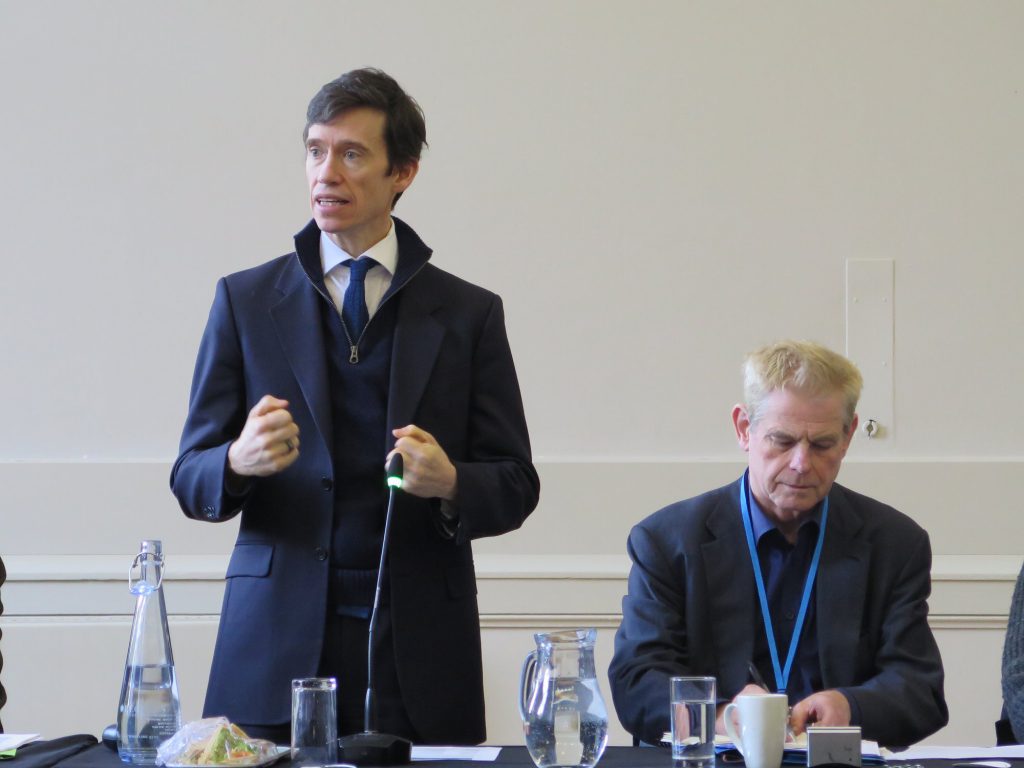
Rory Stewart, former Conservative MP, cabinet minister, and former contender for Conservative party leader, says London could have a “very, very central” part to play in Britain’s future relations with the European Union.
Stewart was an independent candidate for London mayor in elections scheduled for May 7 2020 but withdrew after they were postponed for a year.
He told an AEJ UK meeting on January 29 2020 that London’s connections and contributions are crucial to the success of the rest of the UK and it could act as a bridge between Britain and the EU over the next 10 to 15 years in areas such as artificial intelligence, robotics and nanotechnology while still learning from policies in other European cities. For more on his argument and following discussion please see this report from former FT correspondent Peter Norman and this audio recording of the meeting.
2019
20 November 2019
Lord Peter Ricketts – The future after Brexit
Britain’s role in the world will require a new national strategy if Brexit happens – and that needs a lot more attention says one of Britain’s top diplomats.
Lord Peter Ricketts, former UK National Security Adviser and head of the diplomatic service, told an AEJ lunch on November 20th 2019 that’s just one of the multiple challenges facing the UK in a post Brexit world.
For more on his presentation please see this report from former FT correspondent Peter Norman and this audio record.
23 October 2019
Lord David Willetts – Will Brexit cause more civil unrest?
That’s one of the questions posed to – and by – Lord David Willetts, a prominent Conservative Party thinker, former minister, and until recently Executive Chair of the Resolution Foundation, an independent think tank focused on improving living standards for people on low to middle incomes.
“Very polarised and volatile” is how the current mood in England was described by the Archbishop of Canterbury – and he advised prime minister Boris Johnson and other politicians to stop stoking hate and using inflammatory language. At an AEJ UK meeting on October 23 Lord Willetts tried to bring some clearer perspective to the social, economic and political issues increasingly polarised by Brexit.
For more on the former Universities and Science Minister’s in-depth analysis please see this report from ex-FT correspondent Peter Norman and this audio record of the meeting.
24 September 2019
Catherine Barnard – State of play
Confused about Brexit? Less than two hours after the UK Supreme Court ruled that the government’s suspension of Parliament was illegal, one of the leading experts on European Union law, Catherine Barnard, gave an instant assessment of the landmark ruling and clarified some of the possible ways forward.
At the AEJ UK on September 24 the professor of European Union and Labour Law at Trinity College Cambridge and a senior fellow at The UK in a Changing Europe explained the consequences of a no-deal Brexit and the other possible courses of action by Boris Johnson’s government up to October 31st, as well as the massive task ahead to negotiate a long-term treaty between the UK and its major trading partners in Europe.
Please see here for a report on the meeting from AEJ member and ex FT correspondent Peter Norman, an audio record of the meeting.
30 May 2019
Brunello Rosa – European populism is not “contained”
That at least is the view of Brunello Rosa, CEO of Rosa and Roubini Associates and an analyst of strategic country risks who closely monitors geopolitical trends and the economic performance of countries across Europe.
He told the AEJ UK on May 30 he strongly disagreed with the idea that “populists have been contained” as expressed by Martin Selmayr, secretary general of the European Commission, and other observers. He noted the gains by right-wing populist parties in May’s elections for the European Parliament and spelled out some of the impact they may have. For more on his presentation please see this report from AEJ member Charles Jenkins and this audio record of the meeting as well as these reflections on populism and Brexit from AEJ member Tony Robinson, former FT correspondent in Rome and Moscow.
24 April 2019
Robert Hazell – Does the UK face a constitutional crisis?
Yes says constitutional expert Robert Hazell.
And it pits popular sovereignty against parliamentary sovereignty, and the four nations of the UK against each other. But this is a failure of the political system not the United Kingdom’s unwritten constitution the professor of government and the constitution at University College London and founder of its Constitution Unit told the AEJ UK on April 24. He says Brexit has triggered this crisis and its origins lie in the British political system, Westminster’s adversarial political culture, and serious failures of political leadership.
Please see this report on the meeting from former FT correspondent Peter Norman and here for an audio record of his presentation and following questions and answers
29 March 2019
Sir Ivan Rogers – Brexit causes crises
One of the UK’s key political insiders for the last 20 years and the man who represented the UK at the EU until January 2017 says Brexit has put the country into a political crisis – and potentially a constitutional and democratic crisis with unknown economic implications.
Sir Ivan Rogers, the UK Permanent Representative to the EU from November 2013, resigned shortly before Prime Minister Theresa May’s decision to trigger Article 50 on March 29 of that year starting a two-year countdown to Brexit. Before serving at the EU Sir Ivan was principal private secretary to Tony Blair from 2003-06 and David Cameron’s main adviser for Europe and global Issues from 2012-2013. On the day previously designated as the deadline for Brexit Sir Ivan provided the AEJ UK with a uniquely qualified insider’s comprehensive and insightful analysis of how we got here and what might be ahead.
Please listen here for an audio record of his remarks and following questions and answers. Earlier the same day Sir Ivan participated in a similar panel discussion at Chatham House which can be viewed here.
2018
22 November 2018
Sir Nigel Sheinwald – Bleak outlook with Brexit says former top UK diplomat
Sir Nigel Sheinwald, one of the UK’s top diplomats before he retired, is not hopeful.
In a meeting with the AEJ UK on November 22 to discuss Britain’s future after Brexit he asked if there are grounds for optimism.
And his conclusion was very few. He said outside the EU, the UK would lose influence at a practical level and would lose stature in the view of the rest of the world.
And the UK’s position is further weakened by two other factors he added – the fraying of its relationship and influence with the United States under President Donald Trump, and threats to the multilateral system of alliances and institutions that has served much of the western world for 70 years since the Second World War.
Sir Nigel has 36 years experience as a UK diplomat including his three final jobs as UK ambassador to the US from 2007 to 2012, foreign policy and defence advisor to Prime Minister Tony Blair from 2003 to 2007, and UK Ambassador to the EU from 2000 to 2003.
Despite his pessimistic view of the future he did have some advice for UK action after Brexit so for more on his thoughts please read this report from former FT correspondent Peter Norman.
28-29 September 2018
AEJ UK 50th anniversary debate on Brexit
Fifty years after its formation in 1968 the AEJ UK hosted an open and substantial dialogue among figures from opposing sides of the Brexit debate in a special AEJ UK 50th anniversary debate.
Six months before the UK’s scheduled departure from the European Union and at a time when the outcome of the negotiations was shrouded in extraordinary uncertainty, close to 100 diplomats, officials, and professionals from many fields including more than 40 journalists from all corners of Europe engaged in the debate.
Anniversary debate on Brexit
4 September 2018
Lord Peter Lilley – No deal Brexit will work..
says Lord Peter Lilley, former Conservative cabinet minister and outspoken supporter of the UK’s exit from the European Union.
He outlined his arguments to the AEJ UK’s first autumn lunch meeting on September 4 in a presentation he described as intentionally provocative.
It came as the UK government faced make or break negotiations with the EU on their future relationship and widespread criticism of its Chequers negotiating plan both inside Parliament and across the UK.
Peter Lilley says the Chequers plan is “moribund” and adds that the May government looks like it needs lessons in trade negotiating and is giving lessons in political suicide.
Most important, says Lilley, is what the UK does with the powers it takes back with Brexit. Ultimately he says Brexit is a political issue and urged people not to exaggerate the importance of trade deals.
For more on his presentation please see this report on the meeting from AEJ member and former FT correspondent Peter Norman and this audio record of the meeting.
25 June 2018
Paul Lever – Germany and the EU
Both supporters and opponents of Brexit might want to consider their expectations of Germany’s role in the process.
That was NOT the message to the AEJ UK from Britain’s former ambassador to Germany – but it was inherent in his wide ranging and in depth analysis of Germany’s role in Europe.
Sir Paul Lever, UK ambassador to Germany from 1997 to 2003 and author of a recent book on the subject, says despite becoming Europe’s dominant power, Germany has limited policy ambitions and no blueprint for Europe’s future.
At the AEJ UK on June 25, Sir Paul said Germany’s key goals are supporting its national interests and economic strength while preserving what has already been achieved in Europe. So it is unlikely to show any appetite for grand EU integration plans as suggested by France’s President Emmanuel Macron – and has already shown constraints on any support for adjustments to the EU’s trading relations with Britain under both UK Prime Ministers David Cameron and Theresa May.
For more on Sir Paul’s wide ranging and in-depth analysis please see this report by AEJ member and former FT correspondent Peter Norman and this audio record of his remarks and following discussion.
24 May 2018
Baroness Dianne Hayter of Kentish Town – Labour’s balancing act
As Brexit continues to divide both of the UK’s two major political parties and the British people, Labour’s shadow deputy leader in the House of Lords and spokesperson for exiting the EU walked the fine line between Labour’s stance on Brexit and political realities.
At a meeting of the AEJ UK on 24 May 2018, Baroness Dianne Hayter of Kentish Town explained why she and other Labour members of the unelected House of Lords had challenged the UK government by forcing a series of amendments to the EU Withdrawal Bill in the upper house.
She says Labour is attempting to move Conservative Prime Minister Theresa May away from her hard red lines in negotiations with the EU and believes the final decisions on Brexit should be in the hands of MPs in the House of Commons.
She also thinks that the Lords votes for 15 amendments to the government’s withdrawal bill may influence public opinion and debate on the kind of Brexit that will eventually happen.
She acknowledged there was no clear evidence of a shift in public support or opposition to Brexit in most polling results since the referendum, including Labour’s own private polling and her own contacts with voters.
There is however a recent analysis of multiple polls by the YouGov polling organization that questions this orthodoxy and suggests some possibly important shifts away from Brexit.
Baroness Hayter was walking her own fine line inside Labour as a former strong supporter of Tony Blair now articulating a position under EU-sceptic party leader Jeremy Corbyn. She personally opposed Brexit and considers it a looming nightmare, but insists that the Labour party will honour the result of the June 2016 referendum.
Baroness Hayter was Labour Party chairman from 2007-8, became a Labour peer in 2010, and previously held senior posts in the legal, financial and consumer affairs industries.
For more on this meeting please see this article by AEJ member Nick Hopkinson and this audio record of her remarks and following discussion.
23 March 2018
David Isaac – Will Brexit damage human rights in the UK?
The chairman of the UK Equality and Human Rights Commission says it could if the government’s Brexit withdrawal bill is not changed.
At the AEJ UK on 23 March 2018, David Isaac explained the basis for his concern – backed by a number of NGOs working on human rights in the UK – that plans for incorporating European into English (and Scottish and Northern Ireland) law did not live up to the government’s promise that Brexit would leave our rights unchanged.
Please see this account from Hugh Sandeman and here for an audio record of the meeting.
20 February 2018
Bob Bischof – German business on Brexit
There will be a Brexit deal says the leading voice of German business in the UK.
Bob Bischof, vice president of the German British Chamber of Industry and Commerce and chairman of the German British Forum, said German business is confident of a Brexit deal and made his case at an AEJ UK meeting on February 20 2018.
See here for a report on the meeting from AEJ member and former FT correspondent Peter Norman. And here for an audio record of his remarks and subsequent questions and answers.
17 January 2018
Sergei Guriev – Democracy and Populism
The European Bank for Reconstruction and Development’s chief economist says populist government benefits corrupt elites.
And Sergei Guriev, linking the rise of nationalist populism in western countries with “reform reversal” in some post-communist countries, argues that populist governments remove political checks and do not create free markets and democracy whereas states which consolidate democracy do well.
He was speaking at the AEJ’s first meeting of 2018 on January 17 about the political economy of reform in Europe and its neighbourhood.
Dr. Guriev is a former senior Russian economic policy advisor now in exile and working for the EBRD. His bank’s Transition 2017-18 report shows economic performance in many parts of the former Soviet Union has fallen behind other global emerging markets because of excessive state controls and weak corporate governance.
His remarks before he went off the record are here – and they prompted these personal reflections from AEJ member Anthony Robinson, a former east Europe editor of the Financial Times.
2017
9 November 2017
Lord Andrew Adonis – Stopping Brexit
Lord Andrew Adonis says it’s time to stop Brexit.
And 7 weeks after outlining concerns to the AEJ, he underlined them in Christmas week by resigning as infrastructure tsar for the Conservative government of Theresa May.
At an AEJ-UK lunch meeting on Nov. 9 2017, the Labour peer and former Labour minister for education and for transport offered even odds on reversing the current political process to exit the European Union. Speaking while he was still chair of the UK Infrastructure Commission, Lord Adonis said the next 18 months are crucial.
For more on his analysis to the AEJ-UK please see this report from AEJ member and former FT correspondent Peter Norman.
12 October 2017
Paddy Ashdown, former Liberal Democrat Leader – Brexit will not happen…
says Paddy Ashdown, former leader of the Liberal Democrats and now the party’s leading elder statesman.
As recently as July 2017, Lord Ashdown of Norton-sub-Hamdon – Liberal Democrat leader from 1988 to 1999 and a bitter opponent of Brexit – expected Brexit to take place.
But he has changed his mind and thinks Brexit will not happen.
Speaking to the AEJ’s lunchtime meeting on 12 October 2017, he painted a grim picture of a dysfunctional UK government that is incapable of negotiating a satisfactory withdrawal from the EU and which could collapse next year.
By a narrow margin, he believes Britain will stay in the EU but retreat from an active international role and lose global influence.
Drawing on his many and varied experiences as a Royal Marine, intelligence officer, diplomat, politician and international administrator, Lord Ashdown also commented on a range of international issues in this “most dangerous, volatile and frightening age” of his lifetime.
Please see this summary of his remarks from AEJ member and former FT correspondent Peter Norman.
15 September 2017
Lord John Kerr of Kinlochard – Article 50 can be stopped or revoked
The author of Article 50, Lord John Kerr of Kinlochard, says negotiators for both the UK and the EU have made fundamental mistakes and become mired in public disagreements.
And he warned of a “precipice” in the UK’s relations with the EU if the talks end without agreement.
At a meeting of the AEJ UK on September 15 2017 he also said there is nothing in the law to prevent the UK from changing its mind and stopping or revoking the process of UK exit from the EU.
It’s by no means the first time he’s said this but at the AEJ UK meeting he spelled out his analysis of the Brexit process in forensic detail.
A former head of the UK Foreign Office and a cross-bench (independent) peer since 2004, Lord Kerr has emerged as a severe critic of the UK government’s approach to Brexit.
He has called for a halt to the Brexit process and a national debate in the UK to think again about leaving the EU, previously describing the UK government’s actions since the referendum as “a completely wasted year while the Tories negotiated with themselves”.
Known in Brussels as a wily and effective negotiator, Lord Kerr held senior posts in the UK Treasury as well as the Foreign Office. He was UK ambassador to the EU and the U.S. before taking the top Foreign Office job in 1997. In 2002/3, after retiring as a UK diplomat, he was secretary general to the European Convention, where he drafted the EU exit clause that became Article 50.
See this detailed report by AEJ UK chairman William Horsley and an audio recording of the meeting.
Lord Kerr article on Politico
Blunders on both sides?
6 April 2017
Dominique Moisi
Just two weeks before the first round of the 2017 French presidential elections the veteran political scientist and columnist said it was the most unpredictable and most important election he could remember in a lifetime of observing and analysing French politics and international affairs.
And, he added, if Brexit is likely to damage the EU then a victory for Marine le Pen and her far-right Front National would have been far worse.
On top of the “anger, fear and nostalgia” that has fuelled the last year’s two major political shocks – the UK Brexit vote and Donald Trump’s election – France had two additional unpredictable elements – high levels of voters who were undecided and others who were expected to abstain from voting.
For more on Moisi’s outline of the state of the French politics please see this report from AEJ member Quentin Peel, this audio record of Moisi’s presentation and following questions and answers, and Moisi’s own recent article.
13 March 2017
Jim O’Neill
Donald Trump’s advisers are “stuck in the dark ages” and the UK government of Theresa May has yet to “get real” about Brexit says the man dubbed the high priest of globalisation.
Jim O’Neill is the former chief economist of Goldman Sachs who coined the term BRICs in 2001 for the rising economies of Brazil, Russia, India and China; a former Treasury minister in David Cameron’s Conservative government; and one of the world’s pre-eminent proponents of globalisation.
He says the populist politics of Brexit and Donald Trump are hostile to further growth and out of sync with world economic trends. Despite much of the political rhetoric surrounding both Trump and Brexit – and from other political leaders – he says world economic growth is not slowing, noting that in this decade it is in line with performance in the 1980s and 1990 and “not as weak as often perceived” by western leaders.
For more on his nuanced and informed briefing to the AEJ UK on March 13 please see this report on the meeting from AEJ member and former FT correspondent Peter Norman; and here for an audio record of Lord O’Neill’s remarks and following questions and answers.
And for more of his comments on Brexit see this report on Politico.
On the wider issue of globalisation, Lord O’Neill of Gatley has recently been arguing in articles and on a BBC radio series for a re-examination and urging business leaders to address issues which have left vast numbers of industrial workers and regions in the western world reeling and disaffected.
15 February 2017
Vernon Bogdanor
One of Britain’s foremost constitutional experts says last year’s referendum vote for Brexit shows that Britain is a totally different country from its continental neighbours.
Vernon Bogdanor, a historian and constitutional adviser to a number of governments around the world, explains the vote as the result of a long-simmering cultural revolt.
In a wide ranging interpretation of the Brexit vote and its ramifications Prof. Bogdanor also said that it endangers stability in Northern Ireland; Leave voters are likely to suffer most from the consequences of Brexit; current political leaders in England are deceived about the deal they can reach; and there is still a possibility that the Brexit process can be aborted.
Prof. Bogdanor is research professor at the Institute for Contemporary British History at King’s College London, and former professor of government at Oxford University and senior tutor and vice-principal at Brasenose College. He was awarded a CBE for services to constitutional history in 1998 and is a Fellow of the British Academy.
For more on this meeting of the AEJ UK on Feb.15, please see this report from AEJ UK Chairman William Horsley.
27 January 2017
General Sir Richard Barrons
Recently retired head of UK Joint Forces Command and one of Britain’s most respected and formerly highest ranking soldiers.
At the AEJ UK’s first meeting of 2017 he asked are we safe?
In the UK this has not really been a major question – political or military – for the last 25 years. But it’s high time to re-think that said Sir Richard.
He argued that we need a major strategic revamp and new vision in a striking analysis of the strategic gaps and weaknesses in UK and European defences and what he saw as profound failures of strategic decision-making in recent years.
In the wake of Donald Trump’s election in the USA, the Brexit vote in the UK, and further political backlash to be expected in other European countries, he provided a military analysis of a world where Russia and China have already updated their strategy to combine rapid strike capabilities with cyber warfare.
A strategy to protect their own territory and control nearby foreign space, and to use cyber attacks and psychological means to disrupt potential adversaries.
A strategy that can be seen militarily in Russian actions on its own borders and China’s buildup in the South China Sea, digitally in alleged Russian interference in the recent U.S. election of Donald Trump and multiple suspected Chinese cyber attacks against western corporations, and politically in Russian antagonism to NATO and the EU and China’s stance in southeast Asia.
It’s also a more volatile world where even the so-called new leader of the free world Donald Trump could represent a potential threat to peace – in reports from the AEJ meeting in Australia’s Sydney Morning Herald and the UK’s Independent newspaper.
Sir Richard acknowledged his analysis has found no consensus yet in top UK or European military or political circles. But he did believe some key Trump cabinet members who were friends and colleagues from Iraq and Afghanistan – Defence Secretary General James Mattis and Head of Homeland Security retired Major-General John Kelly – understand the strategic challenge.
Here is a full audio record of Sir Richard’s analysis with the questions and answers afterwards.
And for photos please see our Facebook page
2016
29 November 2016
Alex Salmond – Scottish Brexit
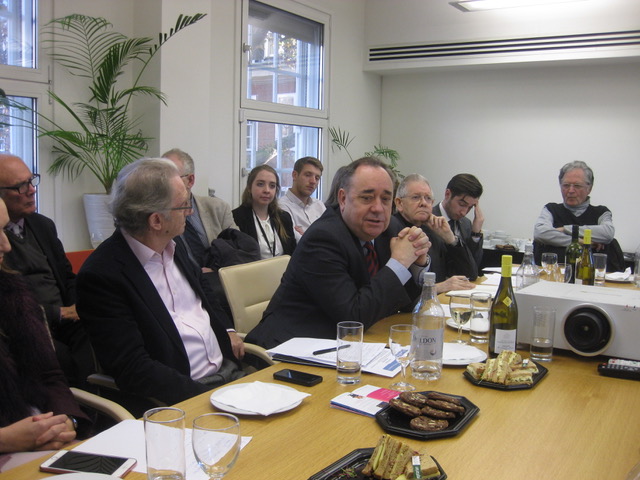
Alex Salmond and two of his Scottish National Party MPs provided a preview of SNP plans on Brexit as they treated us to one of the more memorable meetings of 2016 on Nov. 29.
While the former First Minister of Scotland was trapped in a broken-down Heathrow Express and running late, his two MPs – Stephen Gethins and Tasmina Ahmed-Shah – valiantly tried for 45 minutes to answer a barrage of questions about their plans for dealing with Brexit. When Salmond arrived he brought both calm and some clear answers on SNP strategy:
a desire to stay in the EU, retention of trading and economic relationships in Europe, and as necessary a referendum on independence for Scotland.
His clarity came weeks ahead of the official SNP blueprint released on Dec. 20 by Nicola Sturgeon, Scotland’s First Minister, setting out in detail how the SNP believes the Scottish vote on the EU in/out referendum should be respected.
For more on this meeting please see these notes from AEJ members David Lennon and Rick Thompson.
4-6 November 2016
Brexit dominates AEJ congress
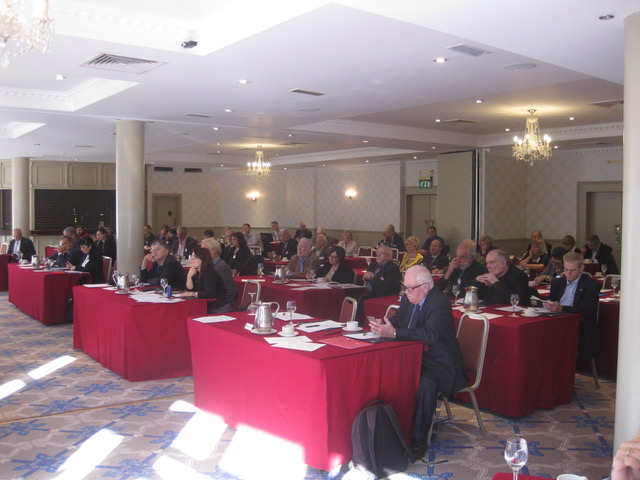
Brexit was on every delegate’s mind and lips at the AEJ’s 2016 annual Congress in Kilkenny in southeastern Ireland – including the chairman of state-owned Allied Irish Bank (AIB) who launched a blistering attack on Brexit.
AEJ 2016 annual congress Kilkenny Ireland
19 September 2016
Alexander Stubb, former prime minister of Finland and EU insider on Brexit
Alexander Stubb told another packed AEJ-UK meeting he believes Brexit is lose-lose for both the UK and the rest of the EU.
And to avoid further damage the former finance minister and leader of Finland’s centre-right National Coalition Party has his own blueprint for a “soft Brexit”.
William Horsley made these notes on his ideas discussed on 19 Sept 2016. Before stepping down as finance minister and party leader, Stubb served Finland as trade and Europe Minister, foreign minister, MEP and adviser to EU Commission President Romano Prodi.
5 September 2016
Sir Simon Fraser, retired senior UK civil servant and trade negotiator on Brexit
Sir Simon Fraser, former permanent under-secretary at the Foreign and Commonwealth Office, provided an insider’s view of Brexit at one of the largest AEJ-UK meetings in recent years.
The 5 Sept. 2016 lunch meeting was packed with members and invited foreign correspondents to hear and question Sir Simon on the details, complications and issues involved in the upcoming process of UK extraction from the European Union.
For more on this meeting please see this blog by AEJ member Jonathan Fryer and this report by BBC News.
Sir Simon retired in July 2015 after a long career with the FCO including secondment to the European Commission; he is now managing partner at business consultancy Flint Global.
July 2016
French Minister Axelle Lemaire on Brexit
A French government minister provided the AEJ UK with a stark and critical assessment of the UK referendum campaign, the UK government’s post-vote strategy, and future prospects for both the UK and the rest of Europe.
Axelle Lemaire, Minister for Digital Affairs in the French Ministry for the Economy and Industry since April 2014, spoke in July 2016 at the AEJ UK’s first meeting since the referendum vote in which the British public voted 52% to 48% to leave the EU.
UK chairman William Horsley made these notes of an animated and informative exchange on July 14, Bastille Day, 2016.

